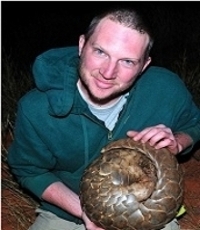Justin Boyles
Associate Professor

Office: LSII 253B
Phone: 618-453-6945
Email: jgboyles@siu.edu
Much of my basic research focuses on the optimal expression of body temperature (i.e. thermoregulation) under varying ecological conditions as well as the evolutionary history that has led to the patterns of thermoregulation we see today. I use a multitude of approaches including non-manipulative data collection under natural conditions, experimental manipulations, computer modeling, and comparative analytical techniques. Insectivorous bats have been the most common model organisms in my past research, but more recently I have expanded my research to include everything from ants to birds to elephant shrews. My current interest in this field is examining how adaptive thermoregulation in endotherms will interact with a changing climate to determine the persistence, range expansion, and basic ecology of birds and mammals.
Education
Ph.D. Indiana State University; Post-doctoral Researcher at University of Pretoria (South Africa) and University of Tennessee Knoxville
Courses taught
Wildlife Techniques (ZOOL 469), Seminar in Wildlife Techniques (ZOOL 585e)
Areas of interest
Conservation physiology; physiological ecology; evolution of thermoregulation; energetics
Selected Recent Publications
Thompson, A.B.*, J.G. Boyles*, A.E. McKechnie, E. Malan, M.M. Humphries, and V. Careau. In Press. Resource needs climate means contributing to a global heterothermic continuum in mammals. Global Ecology and Biogeography. *Contributed equally.
Boyles, J.G., P.M. Cryan, G.F. McCracken, and T.H. Kunz. 2011. Economic importance of bats in agriculture. Science. 332: 41-42.
Lorch, J.M., A.E. Ballman, M.J. Behr, J.G. Boyles, J.T.H. Coleman, P.M. Cryan, A.C. Hicks, C.U. Meteyer, D. Redell, D.M. Reeder, and D.S. Blehert. 2011. Experimental infection of bats with Geomyces destructans causes white-nose syndrome. Nature. 480: 376-378.
Boyles, J.G., F. Seebacher, B. Smit, and A.E. McKechnie, 2011. Adaptive thermoregulation in endotherms may alter response to climate change. Integrative and Comparative Biology. 51: 676-690.
Boyles, J. G. and A. E. McKechnie. 2010. Energy Conservation in hibernating endothems: why "suboptimal" temperatures are optimal. Ecological Modelling. 221: 1644-1647.
Click here to view my webpage.
